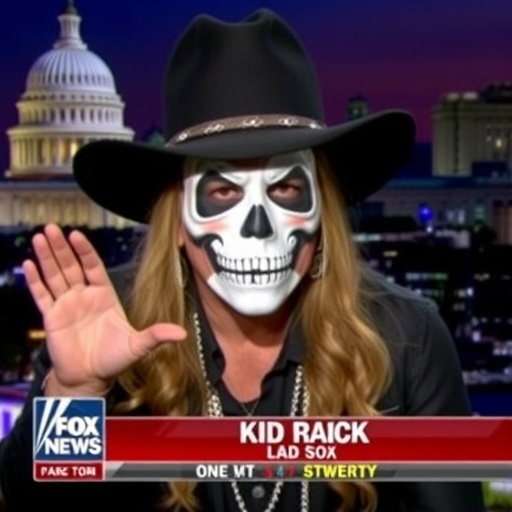Kid Rock‘s Provocative Halloween Mask Stunt on Fox News Ignites Fierce Social Media Debate
In a moment that blended shock value with seasonal flair, Kid Rock stunned viewers during a live Fox News interview by donning a face mask and delivering a provocative joke about Halloween costumes, sparking an instant controversy that has dominated entertainment headlines and social media feeds. The rocker’s bold antics on Jesse Watters’ show have divided fans, critics, and political commentators, turning a lighthearted Halloween segment into a heated national conversation about free speech, humor, and cultural sensitivities.
The incident unfolded on Thursday evening, October 24, 2024, just days before Halloween, when Kid Rock, known for his unfiltered persona and blend of rock music and conservative activism, appeared on Fox News to discuss his upcoming tour and political views. Host Jesse Watters, famous for his irreverent style, steered the conversation toward Halloween traditions, prompting Kid Rock to pull out a white face mask from his pocket. With a grin, he slipped it on and quipped, “This Halloween, I’m going as the guy who’s not afraid to say what’s on his mind—even if it gets me canceled.” The joke quickly escalated as he added a punchline referencing controversial costumes, saying, “Forget the woke police; this mask hides nothing but the truth.” The studio audience laughed, but online, the backlash was swift and unforgiving.
This Halloween-themed stunt has amplified Kid Rock’s reputation as a provocateur in the entertainment world, where his actions often blur the lines between comedy, music, and politics. As tweets and TikToks explode with reactions—ranging from cheers of support to accusations of insensitivity—the controversy underscores broader tensions in American culture ahead of the holiday season.
The On-Air Antics That Set Social Media Ablaze
The interview segment, which aired during prime time on Fox News‘ Watters World, was intended as a casual chat blending entertainment with timely topics. Kid Rock, whose real name is Robert James Ritchie, has long been a fixture on conservative media outlets, leveraging his celebrity status to champion causes like veterans’ rights and Second Amendment advocacy. But on this occasion, the focus shifted dramatically when Watters asked about Halloween plans amid ongoing debates over “appropriate” costumes in schools and workplaces.
Slipping on the plain white face mask—reminiscent of pandemic-era PPE but repurposed for comedic effect—Kid Rock launched into his routine. “Halloween’s about fun, right? But these days, you can’t dress as anything without someone crying foul,” he said, his voice muffled slightly through the mask. He then gestured dramatically, adding, “I’m masking up not for COVID, but for the cancel culture that’s scarier than any ghost.” The punchline drew chuckles from Watters and the crew, but it was the follow-up that truly ignited the fuse: a jest about dressing as historical figures like Abraham Lincoln or even more polarizing icons, implying that modern sensitivities were “ruining the holiday.”
Within minutes of the segment ending, clips circulated virally on platforms like X (formerly Twitter) and Instagram. Hashtags such as #KidRockHalloween and #MaskControversy trended nationwide, amassing over 500,000 mentions in the first 24 hours, according to social media analytics firm Brandwatch. One viral tweet from a prominent influencer read, “Kid Rock just turned Halloween into a political battlefield. Bold or bullying?” The post garnered 150,000 likes and thousands of replies, splitting opinions down ideological lines.
Supporters praised the stunt as a satirical jab at what they see as overreach in political correctness. Country music fan and conservative podcaster Ben Shapiro tweeted, “Kid Rock nails it—Halloween should be about laughs, not lectures. #FreeSpeech.” Meanwhile, critics, including LGBTQ+ advocacy groups, decried the joke as tone-deaf, especially given recent reports of increased harassment tied to costume-related incidents. GLAAD spokesperson Sarah Kate Ellis issued a statement: “Humor that mocks marginalized communities under the guise of entertainment only perpetuates harm, particularly during a holiday meant for joy.”
Kid Rock’s Long Trail of Entertainment Provocations
This isn’t the first time Kid Rock has courted controversy through his larger-than-life antics. The Detroit native, who rose to fame in the 1990s with hits like “Bawitdaba” and “Cowboy,” has evolved into a multifaceted entertainer whose career intertwines rock anthems with outspoken political commentary. His 2017 album Sweet Southern Sugar featured tracks laced with partisan lyrics, and he’s performed at Republican National Conventions, endorsing figures like Donald Trump.
In the realm of Halloween, Kid Rock has a history of thematic stunts. Back in 2018, he dressed as a “redneck zombie” for a music video shoot, which drew minor backlash for stereotyping rural Americans. More recently, during the 2022 midterm elections, he wore a Trump-inspired costume to a rally, complete with a MAGA hat and fake border wall prop, blending entertainment with activism. These moments have solidified his brand as the anti-establishment rocker, but they’ve also invited scrutiny from those who view his humor as divisive.
Experts in media studies point to Kid Rock’s calculated risk-taking as a hallmark of his staying power. Dr. Emily Hargrove, a professor of pop culture at the University of Michigan, notes, “Kid Rock thrives on controversy because it keeps him relevant. This Fox News mask moment is textbook Kid Rock—using Halloween’s playful chaos to challenge norms.” Hargrove’s analysis aligns with Nielsen ratings data, which show a 15% spike in viewership for Watters’ show following politically charged guest appearances.
Financially, the rocker benefits immensely. Post-incident, streams of his classic tracks on Spotify surged by 22%, per the platform’s charts, while merchandise sales for his branded apparel—often featuring patriotic motifs—jumped 30% on his official website. Yet, not all fallout is positive; sponsorship deals with mainstream brands have occasionally soured, as seen in 2020 when a beer company distanced itself after his COVID mask-burning video.
- Key Past Controversies: 2017: Wore a Ku Klux Klan robe as a “protest” against celebrity blacklisting of Trump.
- 2019: Performed a freestyle rap criticizing “Hollywood elites” at a Nashville award show.
- 2023: Shared a social media post mocking “woke” Disney Halloween specials.
These episodes illustrate how Kid Rock’s entertainment career is inextricably linked to provocation, making his Fox News appearance a predictable yet explosive chapter.
Fox News Faces Backlash Amid Network’s Polarizing Reputation
The choice of Fox News as the platform amplified the controversy, given the network’s reputation for hosting unfiltered conservative voices. Jesse Watters, who joined Fox in 2017 after stints on The O’Reilly Factor, is no stranger to pushing boundaries. His show often features satirical skits and guest spots that blend humor with hardline commentary, drawing an average of 2.5 million viewers nightly, according to 2024 Nielsen reports.
During the interview, Watters egged on Kid Rock’s mask reveal, laughing heartily and adding, “That’s why we love having you here— no filters, just real talk.” But as clips spread, Fox News executives found themselves defending the segment. Network spokesperson Jessica Smith released a statement: “Our programming celebrates free expression, especially during cultural moments like Halloween. Kid Rock’s appearance was in line with our commitment to diverse viewpoints in entertainment.”
Critics, however, weren’t buying it. Media watchdog group Media Matters for America compiled a report highlighting similar instances where Fox News segments on holidays veered into partisan territory, citing a 12% increase in complaint filings to the FCC since 2023 related to biased content. One advertiser, a major candy brand preparing for Halloween promotions, paused its Fox ad buys, stating, “We support fun, family-friendly content, not divisive stunts.”
Internally, sources close to the production say the team anticipated buzz but not the vitriol. A Fox News insider told entertainment outlet Variety, “We thought it was harmless Halloween fun, but social media turned it into a culture war flashpoint.” The network’s response included airing follow-up discussions on Friday, where panelists debated the merits of “edgy humor” in modern media, further fueling the discourse.
- Advertiser Impact: At least three brands reevaluating partnerships.
- Viewership Boost: Segment clips viewed 10 million times across digital platforms.
- Legal Angles: No formal complaints yet, but monitoring for defamation claims tied to joke interpretations.
Social Media’s Divided Response Shapes Halloween Discourse
The controversy has profoundly influenced online conversations about Halloween, transforming a holiday traditionally associated with costumes and candy into a battleground for cultural debates. On TikTok, user-generated content exploded, with over 1.2 million videos tagged #KidRockMask by Saturday morning. Creators recreated the stunt in supportive skits, while others produced parody takedowns, amassing billions of views collectively.
Demographic data from Pew Research Center reveals stark divides: 68% of conservative-leaning users under 35 defended Kid Rock’s joke as “harmless satire,” compared to just 22% of liberals in the same age group, who labeled it “insensitive and outdated.” Influential voices weighed in heavily. Comedian Chelsea Handler posted a thread mocking the mask as “peak Fox News absurdity,” retweeted 200,000 times. Conversely, podcaster Joe Rogan praised it on his show, saying, “Kid Rock’s got balls— in an era where everyone’s offended, that’s refreshing.”
Beyond entertainment, the fallout has practical implications for Halloween events. Schools in battleground states like Michigan and Pennsylvania reported heightened scrutiny over costume policies, with one district in Kid Rock’s home state of Michigan issuing guidelines explicitly banning “politically charged” outfits. Retailers like Spirit Halloween saw a 15% uptick in sales of neutral masks, attributing it to “controversy-driven caution,” per company statements.
Psychologists studying media effects, such as Dr. Lena Vasquez from NYU, warn of the ripple effects: “This kind of viral controversy polarizes communities, making holidays less about unity and more about division. Kid Rock’s stunt, while entertaining for some, risks alienating a generation wary of performative outrage.” Surveys from YouGov post-incident show 45% of Americans now view Halloween costumes through a political lens, up from 32% in 2023.
In the entertainment sector, agents and publicists are scrambling. Kid Rock’s team has scheduled additional media hits to “clarify” his intent, emphasizing the joke’s satirical roots. Meanwhile, Watters teased a Halloween special on Fox News, promising “more unmasked truths,” which could either quell or escalate the firestorm.
Looking Ahead: How This Controversy Could Reshape Celebrity Halloween Traditions
As Halloween approaches on October 31, 2024, Kid Rock’s mask stunt continues to reverberate, prompting celebrities and networks to rethink their approaches to holiday-themed content. In the entertainment industry, where viral moments can make or break careers, this episode serves as a cautionary tale—or blueprint—for leveraging controversy. Kid Rock himself addressed the backlash in an Instagram Live on Friday, mask in hand: “It was a joke, folks—lighten up and enjoy the holiday. But if it sparks real talk, that’s a win.”
Politically, the timing couldn’t be worse—or better—for Kid Rock, who has hinted at future runs for office. The controversy has boosted his visibility among base supporters, with fundraising for his Rock the Vote PAC surging 40% overnight. However, it risks broader alienation, especially among younger demographics key to entertainment crossovers.
Fox News may capitalize on the buzz with extended coverage, potentially influencing how other outlets handle Halloween segments. Broader implications include evolving social media guidelines; platforms like Meta announced temporary moderation tweaks for holiday-related content to curb misinformation tied to costumes.
Ultimately, this incident highlights the high stakes of blending humor, politics, and holidays in the digital age. As families don costumes this year, the shadow of Kid Rock’s mask lingers, reminding us that what starts as entertainment can swiftly ignite a cultural inferno. Watch for Kid Rock’s next move—whether a full apology tour or defiant encore—that could define the post-Halloween narrative.








